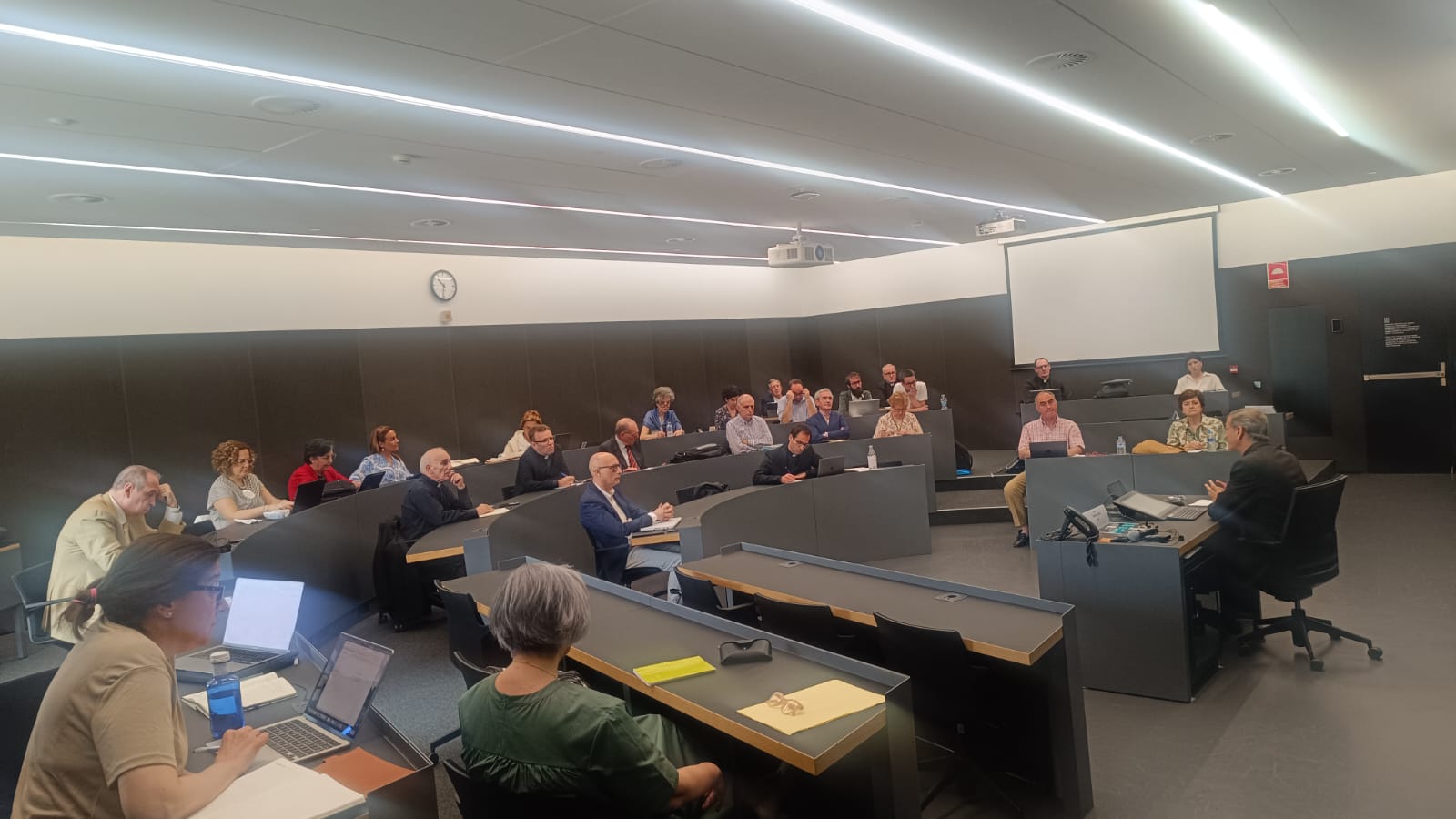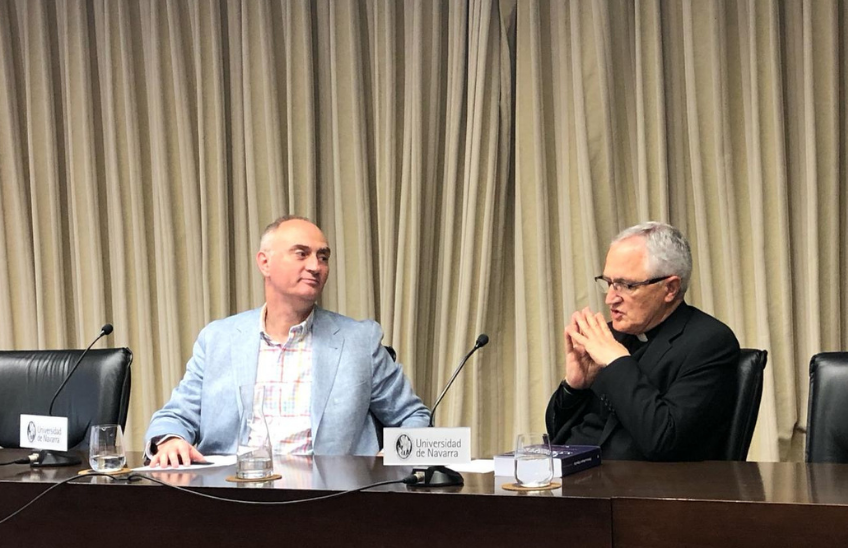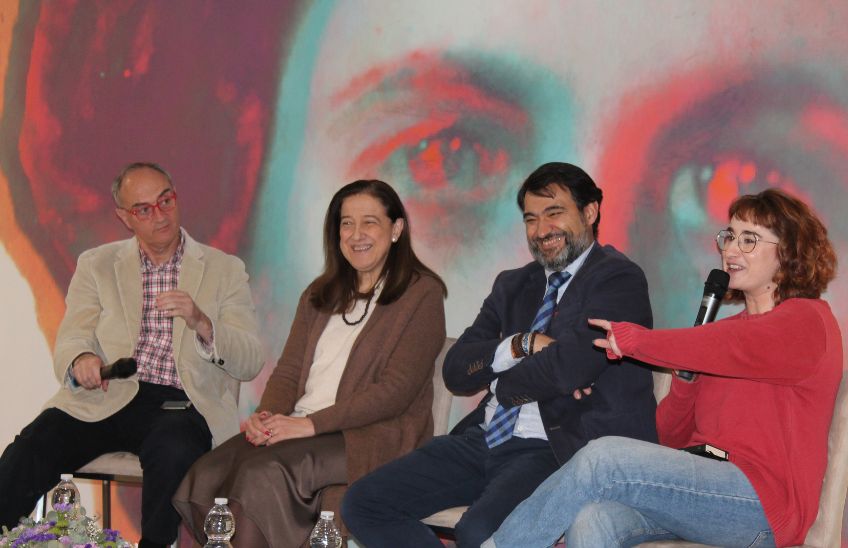Onésimo Díaz: "Christianity continues to expand globally".
In this interview, Onésimo Díaz, historian and professor at the University of Navarra, reflects on Christianity in the contemporary global context. Through his extensive knowledge of the recent history of Spain and the Church, Díaz offers an analysis of the challenges and opportunities for Christianity today.

28 | 05 | 2024
Onésimo Díaz is a historian and professor of Contemporary History at the University of Navarra. His work focuses on the recent history of Spain and Europe, with special emphasis on Opus Dei and the history of the Church after the Spanish Civil War. He has also carried out important research on Catholic intellectuals of the 20th century, such as Rafael Calvo Serer.
Currently, Díaz is a researcher in the Recent History research group at the University of Navarra and Deputy Director of the Josemaría Escrivá Center programs of study . He is the author of several publications, including a trilogy that explores the history of the 20th century through biographies, novels and films. He has recently published Historia, cultura y cristianismo (1870-2020): un relato a través de diez novelas y sus adaptaciones cinematográficas (History, culture and Christianity (1870-2020): an account through ten novels and their film adaptations).
In this interview, Onésimo Díaz offers his vision of Christianity in the contemporary world, analyzing the challenges it faces and how, despite its perceived decline in certain regions, it continues to expand globally. He also delves into the role of Opus Dei within the Church and its impact on today's society.
In your opinion, what are the main challenges facing the Church and Catholics at the present time?
One of the great current debates in Spain -and in other contexts as well- is the absence of visible Catholic intellectuals. conference have been held, books have been written asking: where are they? But after reading and reflecting on this issue, I think the more accurate question is: where are the intellectuals, in general?
We live in a time in which it is difficult to find voices with the capacity to profoundly influence public discussion , beyond the noise of social networks or the media. It is not only a question of the absence of Catholic intellectuals, but of a certain cultural weakness in today's society. There is a lack of references capable of enlightening with critical thinking and solid proposals in areas such as politics, Economics or culture.
In this context, moreover, Catholicism is not exactly fashionable. This can generate among many believers an attitude of reservation or even a complex when it comes to intervening publicly. The Church and Catholics, therefore, face the challenge of recovering that intellectual and cultural presence, not as an imposition, but as a free, valuable proposal , capable of dialoguing with today's world.
What role can academic and Christian training institutions play in the face of phenomena such as secularization or cultural relativism?
Today, the world is deeply marked by secularization, especially in the West. Culture, politics, laws, everything seems to have been configured from a perspective where the religious is relegated. In the face of this, academic and Christian training institutions have a core topic: to offer an intellectual and cultural presence that is not limited to defense, but that proposes, inspires and actively contributes to the construction of the common good from a Christian vision of the world.
This challenge is not new: the first Christians already had to face profoundly de-Christianized contexts. What is interesting is that, at the global level, the status is much more complex. While in Europe and the United States the influence of Christianity seems to be diminishing, in other continents - particularly in Africa - Christianity is growing strongly. The latest Annuario Pontificio clearly illustrates this trend. Thus, although the world is changing, Christianity continues to expand globally.
This is why we sometimes exaggerate the idea that "the world is getting worse and worse" from the religious point of view. In reality, there is a movement that some sociologists call "desecularization," a revalorization of the religious in many parts of the world. Christian institutions must be aware of this global scenario, act with hope and continue to form people who can contribute to cultural dialogue from a deep and free Christian identity.
In your research on some Spanish intellectuals who belonged to Opus Dei, have you detected any incompatibility or short-circuit between reason and faith, between the religious dimension and the civic dimension?
I have not detected any incompatibility between reason and faith in the intellectuals I have studied. What I have observed is that, in some cases, their political or cultural opinions have been interpreted as representative of Opus Dei, when in fact they were personal.
In my research -focused on the forties and fifties- on figures such as Rafael Calvo Serer and his entourage, I have observed that each of them acted as free people, with a religious identity marked by Catholic faith, but also with a very staff political and intellectual trajectory.
In the specific case of Calvo Serer, his monarchist and conservative thinking has been interpreted by some historians as if he represented the official position of Opus Dei at that time. And that is not correct. What he wrote or thought was not an institutional voice of Opus Dei.
As is well known, within Opus Dei, freedom is granted to its members in political, economic and cultural matters. Everyone can have his or her own opinion. Rafael Carlos Serer is a clear example of this: he had his own ideas, and some members of Opus Dei shared them, but others did not. In his entourage there were also people in Opus Dei, although few, who agreed with his conservative and monarchist approaches. However, this does not mean that Opus Dei, as an institution, adopted that ideology.
In politics, Opus Dei defends the right of each person to express his or her own opinion, within the limits of the Church's doctrine. If the Church has condemned an ideology or a party, obviously the members of Opus Dei do not agree with those ideas. But within the framework the Church, there is freedom.
Therefore, to identify a person of Opus Dei with a supposed "official ideology" of Opus Dei is not correct. Some of us understand it well, because we know the institution, but there are those who, out of ignorance, tend to make this association or confuse the planes.
From your historical programs of study on Opus Dei, how would you describe its most unique contribution to the Church and the contemporary world?
Opus Dei's most genuine contribution is not in its institutions-such as schools or universities-but in the ordinary life of its members. St. Josemaría spoke of the Work as a small part of the Church, a seed. What is most characteristic is the Christian witness lived by ordinary people, in their families, in their work, with their friends, in a silent and constant way. This is what makes their presence in the Church authentic and significant: the sanctification of everyday life.
I would say that Opus Dei has now reached a certain maturity. It is no longer the small group of the early years, but a broader and more diverse reality, which is beginning to show its true face in the world.
How has Opus Dei's "proposal" been received in different cultural contexts? What nuances would you highlight?
Opus Dei does not have a closed "proposal," as if it were its own plan, but rather transmits a profoundly evangelical message: that we are all called to holiness, in the midst of the world, in daily life. This message is universal, it is the same message that is at the heart of Christianity, and the Work updates it and incarnates it in our time.
The way to carry it out is very concrete and internship: through the testimony of the staff, at home, at work, in a book club or on social networks. But also through training methods that are very characteristic: circles, talks, retreats, retreats, conviviality... I believe that this formative structure, which has a very professional and constant approach , is one of the most genuine contributions of Opus Dei. And the valuable thing is that it is not reserved only for members: many people who are not members of the Work also benefit from it.
In some cultural contexts, the Opus Dei proposal has been received with a certain lack of understanding. There were moments in history when it was perceived as a closed reality, with its own language and dynamics. However, its purpose is the same as that shared by many Christians: to transmit the message of Christ and to accompany others in their desire to live the good in daily life.



